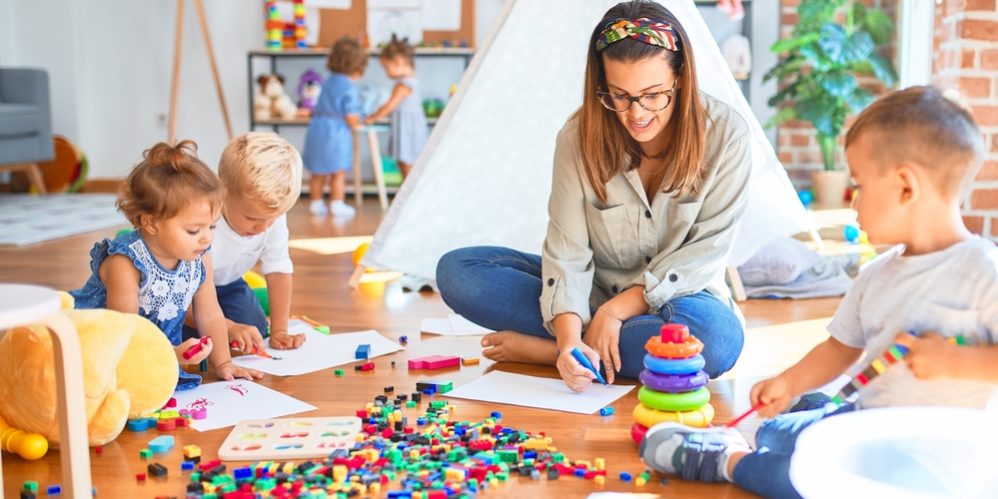If you compare students from a public school with those in a Montessori program, you will immediately notice some differences. The Montessori method is an extremely beneficial approach to early childhood education, because it looks at nurturing every aspect of a child’s development. The result is overwhelmingly positive, as children come out of a Montessori school more positive, cooperative, responsible, and curious.
For over a hundred years, Montessori philosophies have been spreading from Rome to across the world. Nowadays, we see Montessori schools popping up throughout the US, and more and more families are seeing just how exceptional Montessori can be.
Could Montessori transform early childhood education? In many ways, it already has!
How Montessori is Different From Traditional Early Childhood Education
There are many ways that the Montessori method is different, but that’s exactly why it was created in the first place. Dr. Maria Montessori developed her philosophy through observing children at her daycare and made her formal teaching method along the way.
Now, we see Montessori concepts more widely accepted, including:
- Developing the whole child, not just academics. Montessori schools focus more than academic achievement, which is why there are no tests or grades or homework. The focus is to get away from capabilities and socioeconomic status and to give every student the foundation they need for a successful life. This includes practical life skills.
- Using integrated instruction. Montessori schools believe in showing students how things entwine. In other words, children learn to see how different concepts connect in the real world, and they have many opportunities to apply the skills they have mastered in many ways. This develops critical thinking skills, as well as self-confidence.
- Making individual learning plans for every child instead of a basic curriculum. Even traditional schools are starting to shift away from the syllabus for a classroom and focusing more on each student. In Montessori programs, you never see a one-size-fits-all lesson plan. Children are allowed to learn at their own pace and accomplish tasks as they see fit. Furthermore, classes are group by developmental range, not solely by age.
Because these concepts are so widely applauded, traditional schools are beginning to incorporate them as well. People who were in school 20-30 years ago would be surprised to see what has changed and what has remained the same. Yet, Montessori schools know best at how to inspire a love of learning, creativity, and self-reliance in children.
Looking at a Study on Montessori Education
As mentioned, Montessori is reshaping early childhood education, because the methods that make Montessori successful are catching on elsewhere. Even traditional schools are starting to see the value of a Montessori education. Science, too, has shown the advantages of enrolling children into an accredited Montessori program.
One study compared two classrooms in an urban zone. Conducted by researchers from the University of Utah and Jennifer Spikner from Chicago, Illinois, a study entitled Montessori Education and a Neighborhood School: A Case Study of Two Early Childhood Education Classrooms proves the effectiveness of Montessori schooling.
The study included a public school district, university, public elementary school, and a privately owned Montessori school. The public school took 2 of its 4 early childhood programs and implemented a Montessori-style education; two teachers also volunteered to be certified in the Montessori method. Next, the Montessori school sent assistance to guide the program and ensured the classrooms had the appropriate materials.
During the period of the study, the 4 classrooms—two traditional and two Montessori—were observed and interviewed. The data collected showed the following for the Montessori classroom:
- Family engagement in learning increased
- Children in the Montessori classroom learned more than those in the traditional classrooms
- Students learned to clearly express themselves in the Montessori classroom
- Grace and Courtesy lessons built a community founded on respect within the classroom
The Montessori model was also implemented on a larger school within the public school, and the results were the same.
Is Montessori The Future of Education?
Right now, it is difficult to say whether or not Montessori methods will be incorporated at a larger scale. Hopefully, studies continue and on larger scales, as well as among different age groups. Since the case study was done in a school district serving a diverse community, it also showed that children from all walks of life can learn at the same rate.
Montessori education does many things differently, including Freedom Within Limits, Grace and Courtesy, and the Prepared Environment. But these are also things that can be brought into any regular classroom or even into your home. The best way to get the benefits of a Montessori education, however, is to enroll your child in a Montessori school, like Fishtown Montessori.
Interested in checking out a Montessori classroom? Go on a virtual tour around our school! Fill out the form or give us a call today to learn more.






